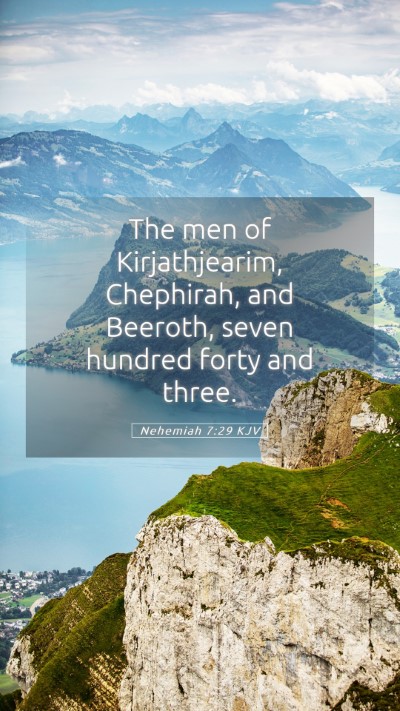Understanding Nehemiah 7:29: A Comprehensive Bible Verse Commentary
Nehemiah 7:29 states, "The men of Benjamin: Salu the son of Meshullam, the son of Joed, the son of Pedaiah." This verse specifically lists the names of individuals from the tribe of Benjamin as part of Nehemiah's census, which is fundamental to establishing the community of returned exiles in Jerusalem.
Historical Context and Significance
To fully grasp the meaning of Nehemiah 7:29, it is essential to understand the historical context. Nehemiah was a leader during the time of the return from Babylonian exile. His work involved rebuilding the walls of Jerusalem and restoring its population, culture, and religious practices. The mention of specific names not only emphasizes the heritage but also reflects on the importance of lineage and familial structures in Jewish society.
Insights from Public Domain Commentaries
-
Matthew Henry's Commentary:
Henry emphasizes the significance of recorded names in the context of community identity. Each name carries a legacy and represents a family that contributes to the restoration of Jerusalem. This underscores the idea that every individual's contribution is valuable in the sight of God.
-
Albert Barnes' Notes:
Barnes highlights the organized nature of Nehemiah's census, indicating that Nehemiah took meticulous care to ensure that each tribe was accounted for. This diligence not only provided a methodical approach to governance but also reinforced community unity among the returning exiles.
-
Adam Clarke's Commentary:
Clarke points out that the reference to Benjamin connects to the historical roots of the tribe, reminding the people of their origins and identity. This return to roots was essential for the people to understand their purpose and role within the newly formed community in Jerusalem.
Key Themes and Application
The themes drawn from Nehemiah 7:29 include:
- Community Restoration: The recounting of names signifies not just individuals but a community coming together after years of exile.
- Identity and Heritage: For the Israelites, knowing one's lineage reinforced their identity as a chosen people, with responsibilities towards God and each other.
- Organization for Purpose: The systematic approach taken by Nehemiah in listing names suggests that divine work often requires order and deliberate planning.
Bible Study Insights
For those engaging in bible study groups or seeking online bible study resources, analyzing censuses in the Bible can offer profound insights into how God values individuals within a community. Understanding the significance of Scripture analysis in historical contexts can also help in applying biblical teachings to daily life.
Additional Bible Cross References
- Ezra 2:1-70: The list of returning exiles.
- Nehemiah 11:4-9: Further details on the people from Benjamin.
- 1 Chronicles 12:1-9: The valor and lineage of the Benjamites.
Conclusion
In conclusion, Nehemiah 7:29 serves as a reminder of the importance of community, heritage, and organization in the pursuit of God's plans for His people. By exploring this verse through the lens of public domain commentaries, we find rich bible verse explanations that deepen our understanding of the meaning of Bible verses and the intricate tapestry of God's redemptive history. This careful biblical exegesis offers valuable bible study insights and helps believers to appreciate how historical contexts inform our understanding of Scripture today.


